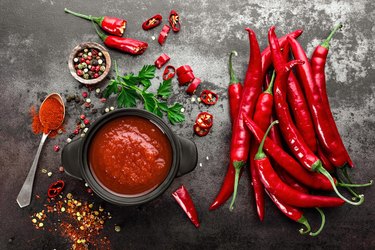
Rectal bleeding is typically discovered in the form of bright red blood that may appear on the toilet paper or in the toilet bowl. If you've consumed chili peppers or hot sauce made from them, this may lead to a burning sensation that makes you wonder if the bleeding is caused by the hot sauce. It's unlikely that hot sauces of the types most commonly consumed are the direct cause of the bleeding. But understanding how chili can contribute to digestive and bowel symptoms can help you gauge your intake.
Hemorrhoids
Video of the Day
Most cases of rectal bleeding come from hemorrhoids, also known as piles, which are swollen blood vessels in the lower rectum. When you pass a stool, the vessels may rupture and release bright red blood. Many healthcare practitioners tell people spicy foods can irritate hemorrhoids because they stimulate the colon and anus. On the other hand, in one study published in the June 2006 edition of "Diseases of the Colon and Rectum," 50 people with mild to moderate hemorrhoids were assigned to take either a placebo or a daily pill containing hot pepper and to rate their symptoms, including bleeding in the 48 hours after taking the pill. They also rated pain, swelling, burning and itching. The results showed no significant evidence that the chili powder aggravated symptoms more than placebo.
Video of the Day
Anal Fissure
Another direct cause of rectal bleeding is the anal fissure, which is a tear or break in the lining of the lower rectum. Hot pepper sauce has been shown to aggravate burning and pain in the fissure, but here again there's no evidence that they directly cause bleeding. However, chili is known to speed up the elimination process -- in other words, it may cause you to pass more stools more often and therefore could indirectly be a cause of rectal bleeding by aggravating fissures.
Is It Really Blood?
Keep in mind that some foods and drinks are just as red coming out as they are when you're ingesting them. Beets and beet juice have given more than one person a fright, and red wine, red-colored sodas, red frosting and even watermelon may give you a start by manifesting as a "false positive" visual for blood in the stool.
To Burn or Not to Burn?
There is a growing body of evidence that hot chili pepper may actually be good for some digestive problems. A study in the November 2012 "Journal of Neurogastroenterology and Motility" found that people with irritable bowel syndrome who ate chilies for six weeks had less abdominal burning sensations compared with placebo. The researchers concluded that chilies may be effective for treating various types of functional gastrointestinal disorders, some of which cause bleeding, though more research is needed.
Warnings and Precautions
Persistent or heavy rectal bleeding could be an indication of a serious condition and should be evaluated by a healthcare practitioner on an urgent or emergency basis. Such bleeding accompanied by severe abdominal pain or cramping or anal pain should also be evaluated promptly. While many cases of rectal bleeding are attributable to hemorrhoids and anal fissures, other less-common-yet-serious causes are possible, such as diverticulosis, ischemic colitis, irritable bowel syndrome, colon cancer, colon polyps, proctitis and certain food-borne illnesses.
- Diseases of the Colon and Rectum: Red Hot Chili Pepper and Hemorrhoids: The Explosion of a Myth: Results of a Prospective, Randomized, Placebo-Controlled, Crossover Trial
- Arquivos de Gastroenterologia: Consumption of Red-Hot Chili Pepper Increases Symptoms in Patients With Acute Anal Fissures. A Prospective, Randomized, Placebo-Controlled, Double Blind, Crossover Trial
- Journal of Neurogastroenterology and Motility: Effects of Chili Treatment on Gastrointestinal and Rectal Sensation in Diarrhea-Predominant Irritable Bowel Syndrome: A Randomized, Double-Blinded, Crossover Study.
- Current Gastrointestinal Report: Lower GI Bleeding: Epidemiology and Management
- Medical Surgical Nursing: Hemorrhoids
- Hemmorhoids; Hyung Kyu Yang
Is this an emergency? If you are experiencing serious medical symptoms, please see the National Library of Medicine’s list of signs you need emergency medical attention or call 911.